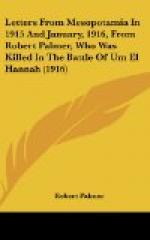I should also like from Blackwell’s a good and up-to-date map of these parts, i.e. from the Troad to the Persian Gulf.
* * * * *
AMARAH.
October 21, 1915.
TO HIS MOTHER.
It is hard from here to be patient with the Government for not taking a bolder line all round and saying frankly what they want. They are omnipotent if they would only lead. Now we hear that Carson has resigned. I can’t hitch that on to the conscription crisis, yet it doesn’t say it is from ill-health: it is a puzzle.
Life is as uneventful as usual here. I have nearly finished The Woman in White. It is really one of the best thrillers I’ve read, and Count Fosco more than fulfils my expectations: I wonder if Haldane keeps white mice. I have also finished Tennyson. I have read him right through in the course of the year, which is much the best way to read a poet, as you can follow the development of his thoughts. His mind, to my thinking, was profound but not of very wide range, and strangely abstract. His only pressing intellectual problems are those of immortality and evil, and he reached his point of view on those before he was forty. He never advances or recedes from the position summarised in the preface to “In Memoriam,” d. 1849. The result is that his later work lacks the inspiration of restlessness and discovery, and he tends to put more and more of his genius into the technique of his verse and less into the meaning. The versification is marvellous, but one gets tired of it, and he often has nothing to say and has to spin out commonplaces in rich language. One feels this even in the “Idylls of the King,” which are the best of his later or middle long efforts: they are artificial, not impulsive; Virgil, not Homer; Meredith calls them ‘dandiacal flutings,’




